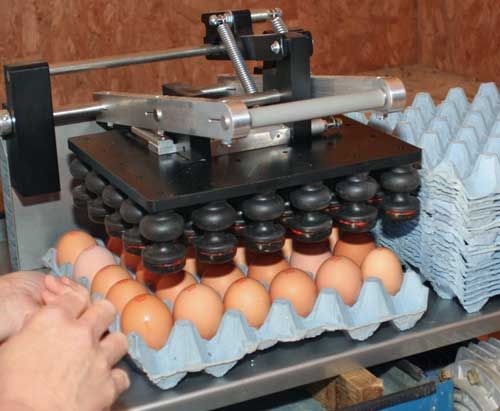
New rules insisting on the use of on-farm stamping for free range egg producers operating under the Lion code have now come into force.
On-farm stamping was already in operation for Lion cage producers and was originally due to come into effect for non-cage producers, including free range, from the beginning of this year, but the British Egg Industry Council agreed to delay implementation for six months to give non-cage units more time to source suitable stamping equipment. The new rules finally came into force on June 30 and free range producers who want their eggs to be sold through the Lion scheme must now stamp on-farm
’From 30th June 2011, all eggs produced on a Lion registered laying farm are required to be marked on farm with the Producer Establishment Number (PEN),’ said BEIC chief executive Mark Williams in a statement outlining the specific requirements of the on-farm stamping rule.
The introduction of on-farm stamping by Lion is seen as one of the initiatives being undertaken by the egg industry to counter fraud. When conman Keith Owen was jailed for his part in a ’100 million fraud involving Heart of England Eggs near Bromsgrove, the BEIC said it was taking a number of measures to tackle fraudsters. On-farm stamping was one of those measures, along with other improvements to the Lion code to improve security - including unannounced audits of all Lion packing stations and better traceability through a new database to track eggs throughout the system.
The introduction of on-farm stamping enjoyed widespread support within the industry when it was mooted, including the support of the British Free Range Egg Producers Association, whose chairman at the time, Tom Vesey, said that whilst the measure may not prevent fraud on its own it would provide another obstacle for fraudsters to overcome. He said he accepted that on-farm stamping would result in extra costs for small producers but still felt that the measure was a necessary one.
There have been notable opponents of on-farm stamping for non-cage producers, including John Campbell of Glenrath Farms, who has argued openly and persistently that on-farm stamping imposes an unnecessary extra cost on free range producers because, he says, no fraudster is ever going to try to pass off free range eggs as cage. However, Mark Williams says that on-farm stamping enhances traceability.
The measure has applied to Lion cage eggs since December 31 2009, and was to have applied for non-cage Lion eggs from December 31 2010. However, BEIC accepted arguments that smaller free range producers would need more time to assess which stamping equipment would be best suited and most economic for small scale operations. The organisation decided to allow non-cage producers an extra six months to investigate and trial equipment.
Even though the rules are now in force, Mark Williams indicated that scope had been allowed within the new rules to help producers who had problems with equipment He said that the BEIC was producing guidance to laying farms in the event of a breakdown in egg printing equipment and was outlining the action that would need to be taken.
’For Lion cage farms, BEIC already requires that the farm informs their subscriber (packer) and the subscriber notifies BEIC. All eggs are then marked with the PEN in the packing centre until the problem is rectified,’ Mark said in a statement for the Ranger.
’The new guidance will include: a set time frame (maximum of 4 days) for the problem to be corrected (equipment suppliers are to be encouraged to put in place sufficient resource to rectify any problem quickly); notification to the subscriber; and notification to BEIC.’
Anyone who is unsure about the new rules or has a problem with the on-farm stamping is advised to speak to their packer at the earliest opportunity.
